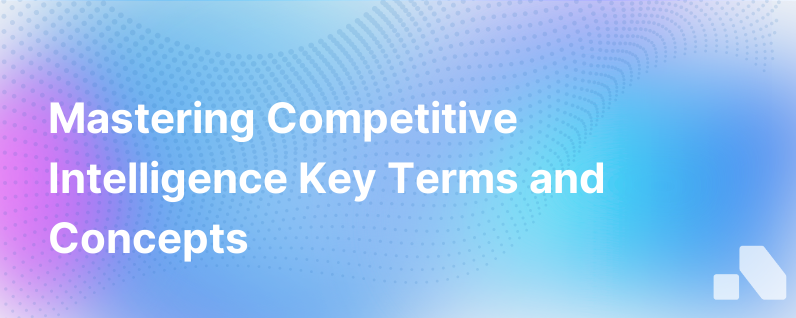What Is Competitive Intelligence Terms And Concepts You Need To Know
Published on November 1, 2023 by Sawyer Middeleer
The recent surge in AI technology has seen companies leveraging it to gain a competitive edge, but, to make the most of these dynamic changes in the modern business landscape, a deep understanding of competitive intelligence (CI) is crucial. While it has been around for a while now, CI's principles and terminology can sometimes sound arcane to those just getting started.
This article aims to demystify competitive intelligence and introduce key terminologies and concepts you need to know.
Understanding Competitive Intelligence
Competitive intelligence is a strategic research process aimed at discovering and analyzing data about competitors, the market, and other external elements that affect an organization's status quo. Businesses use CI to foresee future market trends, anticipate competitor moves, improve decision-making, and maintain or gain a competitive advantage.
CI involves several disciplines, from market research to business intelligence and marketing analysis. The ultimate goal? To uncover actionable insights that inform strategic decisions and help you outperform your competitors.
Key CI Concepts & Terminology
To better understand CI, here are some key terms and concepts you need to know:
1. SWOT Analysis: This competitive marketing strategy involves analyzing an organization's Strengths, Weaknesses, Opportunities, and Threats (SWOT). SWOT analysis is integral to CI and helps companies craft strategies to leverage their strengths, mitigate potential threats, capitalize on opportunities, and address identified weaknesses.
2. Competitor Profiling: Competitor profiling is a detailed analysis of competitors' products, market share, financial performance, strengths, weaknesses, and strategies. Profiling provides insight into how to differentiate your solutions and stay ahead.
3. Market Segmentation: Companies identify segments or groups in the market based on various criteria like demographic, psychographic, geographic, or behavioristic, and then tailor their strategies accordingly. Understanding these segments helps target marketing efforts effectively.
4. Social Listening: This CI strategy involves tracking, analyzing, and responding to conversations about a brand or industry online. It's crucial for reputation management and understanding public sentiment towards your company and competitors.
5. Benchmarking: Benchmarking is the process of measuring a company's products, services, or practices against the market's best performers - the "benchmarks". It's a surefire way of identifying gaps in your offering and understanding where you need to innovate.
6. War Gaming: This is a predictive analysis technique used to envision likely future competitive scenarios and test potential strategy responses. It's a way of preparing for the future by mapping out potential risks and opportunities.
7. Win/Loss Analysis: Evaluating why deals were won or lost provides invaluable insights to understand buyer preferences and aerial view of your strengths and weaknesses.
The Importance of Competitive Intelligence in today's Business Envirnment
Many companies still underestimate the importance of CI, viewing it as a 'nice-to-have' rather than a 'must-have'. However, in our current hyper-competitive business environment, the importance of CI cannot be overstated.
CI helps businesses:
- Make data-driven decisions, reducing uncertainty.
- Stay ahead of industry trends and shifts.
- Monitor competitors in real-time, anticipating their moves.
- Understand their market position and how to differentiate themselves.
- Identify threats and opportunities in the market.
AI tools, like Aomni, are making it easier to gather real-time account research, give actionable competitive insights, and produce personalized sales content. With these tools, you can build a comprehensive CI strategy with minimal effort.
How to Utilize CI Effectively
CI is not just about collecting data; it becomes powerfully transformative when used to inform strategic decision-making. For effective utilization:
- Create a CI team or designate a point person responsible for organizing and interpreting information.
- Use CI tools that streamline the process and offer real-time insights.
- Intersect CI with your overall business strategy. It should align with your organizational objectives.
- Communicate the insights to all necessary teams in the company - marketing, sales, product management, etc.
- Use the insights to drive actionable, strategic shifts in your operations.
In conclusion, competitive intelligence is the secret weapon of thriving companies in the ever-evolving business landscape. It's not just for large companies; businesses of all sizes stand to gain a lot from implementing a robust CI strategy. Take the time to familiarize yourself with these essential terms and concepts, invest in a comprehensive CI tool, like Aomni, and let data-driven insights guide your strategic path forward.